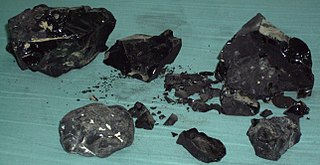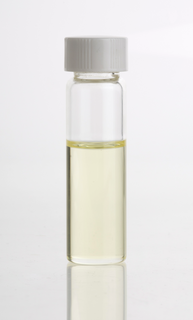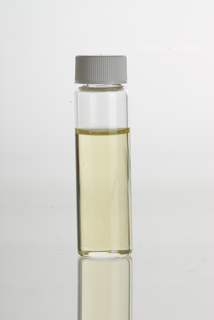Related Research Articles

Asphalt, also known as bitumen, is a sticky, black, highly viscous liquid or semi-solid form of petroleum. It may be found in natural deposits or may be a refined product, and is classed as a pitch. Before the 20th century, the term asphaltum was also used. The word is derived from the Ancient Greek ἄσφαλτος ásphaltos. The largest natural deposit of asphalt in the world, estimated to contain 10 million tons, is the Pitch Lake located in La Brea in southwest Trinidad, within the Siparia Regional Corporation.

Distillation, or classical distillation, is the process of separating the components or substances from a liquid mixture by using selective boiling and condensation. Dry distillation is the heating of solid materials to produce gaseous products. Dry distillation may involve chemical changes such as destructive distillation or cracking and is not discussed under this article. Distillation may result in essentially complete separation, or it may be a partial separation that increases the concentration of selected components in the mixture. In either case, the process exploits differences in the relative volatility of the mixture's components. In industrial applications, distillation is a unit operation of practically universal importance, but it is a physical separation process, not a chemical reaction.

Snake oil is a term used to describe deceptive marketing, health care fraud, or a scam. Similarly, "snake oil salesman" is a common expression used to describe someone who sells, promotes, or is a general proponent of some valueless or fraudulent cure, remedy, or solution. The term comes from the "snake oil" that used to be sold as a cure-all elixir for many kinds of physiological problems. Many 19th-century United States and 18th-century European entrepreneurs advertised and sold mineral oil as "snake oil liniment", making claims about its efficacy as a panacea. Patent medicines that claimed to be a panacea were extremely common from the 18th century until the 20th, particularly among vendors masking addictive drugs such as cocaine, amphetamine, alcohol and opium-based concoctions or elixirs, to be sold at medicine shows as medication or products promoting health.

Soap is a salt of a fatty acid used in a variety of cleansing and lubricating products. In a domestic setting, soaps are surfactants usually used for washing, bathing, and other types of housekeeping. In industrial settings, soaps are used as thickeners, components of some lubricants, and precursors to catalysts.

Perfume is a mixture of fragrant essential oils or aroma compounds (fragrances), fixatives and solvents, usually in liquid form, used to give the human body, animals, food, objects, and living-spaces an agreeable scent. The 1939 Nobel Laureate for Chemistry, Leopold Ružička stated in 1945 that "right from the earliest days of scientific chemistry up to the present time, perfumes have substantially contributed to the development of organic chemistry as regards methods, systematic classification, and theory."

An oil refinery or petroleum refinery is an industrial process plant where petroleum is transformed and refined into useful products such as gasoline (petrol), diesel fuel, asphalt base, fuel oils, heating oil, kerosene, liquefied petroleum gas and petroleum naphtha. Petrochemicals feedstock like ethylene and propylene can also be produced directly by cracking crude oil without the need of using refined products of crude oil such as naphtha. The crude oil feedstock has typically been processed by an oil production plant. There is usually an oil depot at or near an oil refinery for the storage of incoming crude oil feedstock as well as bulk liquid products. In 2020, the total capacity of global refineries for crude oil was about 101.2 million barrels per day.

An essential oil is a concentrated hydrophobic liquid containing volatile chemical compounds from plants. Essential oils are also known as volatile oils, ethereal oils, aetheroleum, or simply as the oil of the plant from which they were extracted, such as oil of clove. An essential oil is essential in the sense that it contains the essence of the plant's fragrance—the characteristic fragrance of the plant from which it is derived. The term "essential" used here does not mean indispensable or usable by the human body, as with the terms essential amino acid or essential fatty acid, which are so called because they are nutritionally required by a living organism.

Lavender oil is an essential oil obtained by distillation from the flower spikes of certain species of lavender. There are over 400 types of lavender species worldwide with different scents and qualities. Two forms are distinguished, lavender flower oil, a colorless oil, insoluble in water, having a density of 0.885 g/mL; and lavender spike oil, a distillate from the herb Lavandula latifolia, having density 0.905 g/mL. Like all essential oils, it is not a pure compound; it is a complex mixture of phytochemicals, including linalool and linalyl acetate.

Liniment, or embrocation, is a medicated topical preparation for application to the skin. Sometimes called a heat rub, a liniment may have viscosity similar to that of water, or may be formulated as a lotion or balm and are usually rubbed on skin to allow penetration of the active ingredients. Patches, sticks, and sprays are also available.

Steam distillation is a separation process that consists in distilling water together with other volatile and non-volatile components. The steam from the boiling water carries the vapor of the volatiles to a condenser; both are cooled and return to the liquid or solid state, while the non-volatile residues remain behind in the boiling container.
Petrochemistry is a branch of chemistry that studies the transformation of crude oil (petroleum) and natural gas into products or raw materials. These petrochemicals have become a major part of the chemical industry today.

Rose oil is the essential oil extracted from the petals of various types of rose. Rose ottos are extracted through steam distillation, while rose absolutes are obtained through solvent extraction, the absolute being used more commonly in perfumery. The production technique originated in Persia. Even with their high price and the advent of organic synthesis, rose oils are still perhaps the most widely used essential oil in perfumery.

Fragrance extraction refers to the separation process of aromatic compounds from raw materials, using methods such as distillation, solvent extraction, expression, sieving, or enfleurage. The results of the extracts are either essential oils, absolutes, concretes, or butters, depending on the amount of waxes in the extracted product.
James Greenwood (1832–1927) was an English social explorer, journalist and writer, who published a series of articles which drew attention to the plight of London's working poor. He was one of the first journalists to cover stories incognito, and is regarded as one of the pioneers of investigative journalism.

Shell Haven was a port on the north bank of the Thames Estuary at the eastern end of Thurrock, Essex, England and then an oil refinery. The refinery closed in 1999 and the site was purchased by DP World who received planning consent in May 2007 for the new London Gateway deep water container port at the site. The neighbouring Coryton Refinery remained in operation until 2012.

Hash oil, also known as honey oil or cannabis oil, is an oleoresin obtained by the extraction of cannabis or hashish. It is a cannabis concentrate containing many of its resins and terpenes – in particular, tetrahydrocannabinol (THC), cannabidiol (CBD), and other cannabinoids. There are various extraction methods, most involving a solvent, such as butane or ethanol. Hash oil is usually consumed by smoking, vaporizing or eating. Hash oil may be sold in cartridges used with pen vaporizers. Preparations of hash oil may be solid or colloidal depending on both production method and temperature and are usually identified by their appearance or characteristics. Color most commonly ranges from transparent golden or light brown, to tan or black. Cannabis retailers in California have reported about 40% of their sales are from cannabis oils. Hash oil is an extracted cannabis product that may use any part of the plant, with minimal or no residual solvent. It is generally thought to be indistinct from traditional hashish, according to the 1961 UN Single Convention on Narcotic Drugs, as it is "the separated resin, whether crude or purified, obtained from the cannabis plant".

Aromatherapy is based on the usage of aromatic materials, including essential oils, and other aroma compounds, with claims for improving psychological or physical well-being. It is offered as a complementary therapy or as a form of alternative medicine, the first meaning alongside standard treatments, the second instead of conventional, evidence-based treatments.

Petroleum refining processes are the chemical engineering processes and other facilities used in petroleum refineries to transform crude oil into useful products such as liquefied petroleum gas (LPG), gasoline or petrol, kerosene, jet fuel, diesel oil and fuel oils.
Garlic oil is the volatile oil derived from garlic. It is usually prepared using steam distillation and can also be produced via distillation using ether. It is used in cooking and as a seasoning, a nutritional supplement, and also as an insecticide.
References
- "Discovering Dickens", a glossary of Dickensian terms